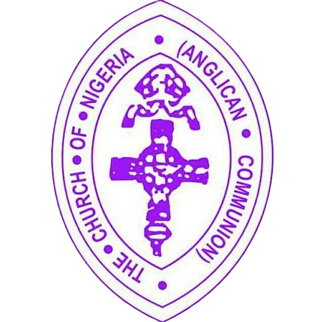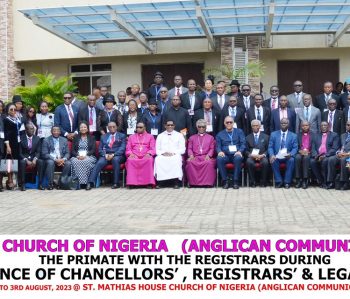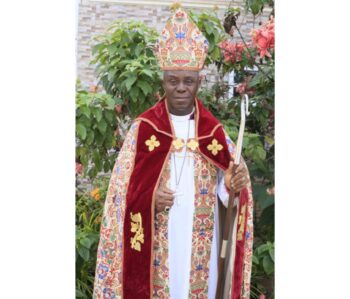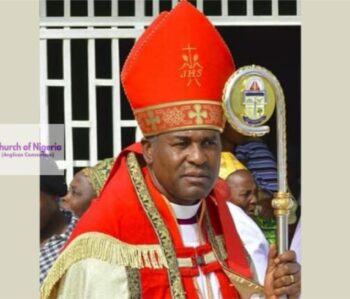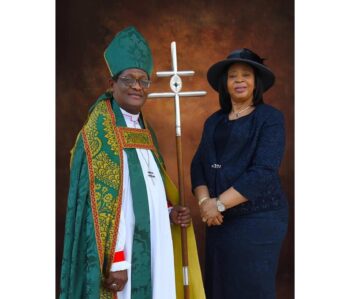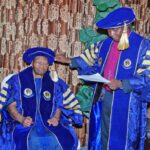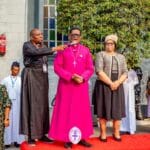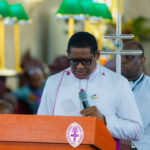- Adesewa Orioye
- July 2, 2024
- 0 Comments
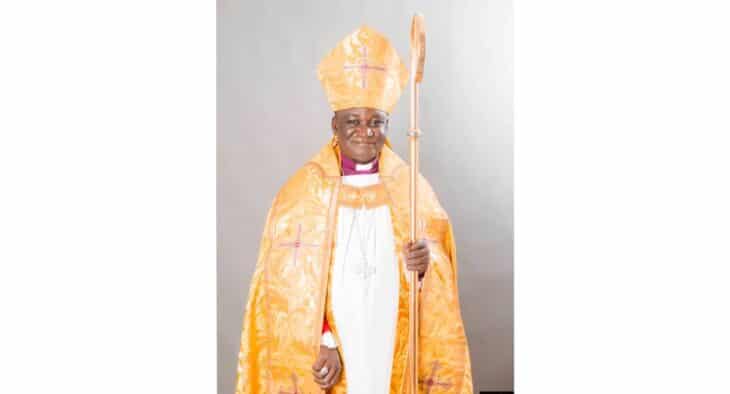
THE COMMUNIQUE ISSUED AT THE END OF THE 1ST SESSION OF THE 23RD SYNOD OF THE DIOCESE OF KADUNA CHURCH OF NIGERIA (ANGLICAN COMMUNION) HELD FROM 30TH OF MAY, 2024 TO 2ND OF JUNE 2024 AT ST. CHRISTOPHER’S ANGLICAN CHURCH, 14 SOKOTO ROAD, KADUNA.
INTRODUCTION:
The 1st session of the 23rd Synod of the Diocese of Kaduna (Anglican Communion) met under the guidance of the Holy Spirit, presided over by The Most Rev’d Dr. Timothy Yahaya, Archbishop of Kaduna Province and the Bishop Diocese of Kaduna accompanied by the Rt. Rev’d. Paul Ojo (The Bishop of Ijumu) the Bible Study facilitator, The Rt. Rev’d. Dr. Michael A. Oluwarohunbi (Bishop of Yewa) the Synod Preacher and The Rt.Rev’d. Davies Festus (Bishop of Ogorimagogo) and The Rev’d Dr. Tosin Adekeye both Synod Resource Persons, held at St. Christopher’s Anglican Church, 14 Sokoto Road, Kaduna from 30th of May to 2nd of June, 2024. In attendance were: house of Bishop – 1, house of clergy – 78, house of laity – 93.
Theme: The theme of the 1st session of the 23rd synod is ‘The Lord is my Shepherd’ taken from Psalms 23: 1, this Psalm is a favourite of so many, a Psalm of reassurance, comfort, blessing and a Psalm that speaks on the personality of God. In a time of fear and anxiety we are to just like David turn completely to the Lord, casting all our cares upon Him, knowing that He is our Shepherd, He will Provide, Protect and guide us all into the inheritance He has set before us in Jesus Name, Amen.
The Synod theme gives us the assurance that the Lord knows what is best for us and He will provide all that we need no matter the condition. Not only will He provide, He will also restore, exalt, guide, protect and comfort us in the times we have found ourselves as individuals, families, communities, society and as a nation. This theme shows God to us as Shepherd, Comforter, Host and Father. The Lord as our Shepherd will lead us into His blessing already prepared for us in the presence of our enemies, He assures us of being with us even when we journey through the valley of the shadow of death and at the end of it all goodness and mercy shall follow us all the days of our lives.
MESSAGE TO THE NATION:
- KADUNA STATE GOVERNMENT
Synod commends His Excellency Sen. Uba Sani for being a unifier and for his focus on rural development, particularly his recent gesture towards the empowerment of our security agencies and the safety of the state by donating 150 operational vehicles and 500 motorcycles to aid in the combat of insecurities in the state.
2. THE HUGE DEBT OF KADUNA STATE
Synod commends the Governor of Kaduna State for exposing the true state of the debt profile of the state and appreciates the Governor’s resolve not to borrow any more. Synod however in light of the forgoing is calling for a forensic audit of all debts acquired and contracts issues by the previous administration.
3. FLOATING OF THE NAIRA
Synod observed the policy of the Central Bank of Nigeria (CBN) issued on the 14th of June, 2023 directing all Deposit Money Banks (DMBs) to eliminate the rate cap on the naira at the investors’ and exporters’ (I&E) window of the foreign exchange market thus floating the naira. Synod notes that this action has created an ever widening gap between the Naira and the Dollar. This has therefore pointed out the pitfalls of this policy from the professional opinions of experts;
- The flotation of the naira would cause instability in the currency exchange rate and lead to a decrease of foreign investment in the country.
- The floatation in an importation depended nation as Nigeria would lead to inflation as cost of imported goods would increase leading to a hike in goods and services especially for those living below the poverty line.
Synod having considered the foregoing, sets forth the ways to survive the short term effect of the floatation of the Naira:
- Nigerians must consider alternative sources of income to cushion the present realities.
- The cut down of unnecessary expenses and the focus on needs instead of wants.
- The exploration of the agricultural sector is now vital either the growing of crops or the raising of livestock for sale.
- The development of a saving culture is paramount to be able to stand in times of emergency.
- Nigerians must be vigilant to notice and appropriate supports from government and non-governmental organizations, support such as grants, training etc.
- Nigerians in such a time as this may be part of a corporative society, to be able to reach more revenues and have access to more opportunities.
Synod reiterates that the floating of the naira could have negative effect on the Nigerian economy and calls for a holistic consideration of the potential risk involved as well as the overall economic situation and objectives of the Country.
4. THE IMPACT OF FUEL SUBSIDY REMOVAL IN NIGERIA
Synod observes that the removal of the fuel subsidy poses challenges in terms of inflation, social unrest and the potential negative impact on the low-income individuals. Synod holds that the decision to remove fuel subsidies should be accompanied by a well thought-out strategy that considers mitigation measures for the vulnerable population and promotes sustainable economic growth.
Synod recommends that the Government should carefully evaluate the impact of fuel subsidy removal on individuals and businesses and provide palliatives and other economic relief programs to cushion the adverse effect.
5. THE CALABAR – LAGOS COASTAL HIGHWAY
Synod observed that the Calabar-Lagos coastal highway is one shrouded in controversy from the date of its unveiling. Synod is also shocked at the utter lack of transparency and empathy to the cries and pains of Nigerians. Synod also noted that the said project is geared and positioned solely for the enjoyment and pleasure of the privileged and ultra monied elite of our society.
Synod opined that a coastal highway is a laudable project but the way and manner it is being handled gives room for a lot of concern. Synod calls on the government to weigh the amount of jobs that would be lost in the demolition of businesses for the proposed highway vis-à-vis how many jobs opportunities the have provided so far.
Synod recommends that the government follows the original design which will not bring untold hardship on Nigerians
6. NIGERIA’S DEBT BURDEN
Synod notes with great concern that the debt profile of Nigeria has been steadily on the rise over the past decade and the current administration has in addition to our high debt profile requested for fresh loans of $8.7 Billion and €100 Million. Synod observes that seeking loans for critical infrastructure and development projects is not inherently bad in itself, it is however worrisome that Nigerians are yet to see anything from the quantum our indebtedness.
Synod calls for transparency and accountability in the loan utilization, this will build public trust and strengthen the need for the loan facility in the first place. Synod calls for all revenue-generating agencies to be fully digitalized and strictly monitored, with supervisory mandates to close and plug every gap.
Synod calls for the government to quit making lip service to diversification of our economy. These diversifications should look beyond the extractives sector to job-elastic sectors like agriculture and manufacturing. Synod calls for the revival of our moribund agricultural sector by ensuring all grants and aid for the agricultural sector get to the actual farmers who will kick start the agricultural sector thus reviving it. Synod calls on states to specialize in industries where they have comparative advantage to boost our export and growth.
Synod reiterates that endless taxation will not help in servicing our debt as no economy is grown solely by taxes and this will only further burden ordinary citizens already struggling with double digit inflation and food insecurity.
Synod is puzzles by the need of the government to seek for additional loans, when we have made a windfall from the removal of subsidy. Synod urges the government to channel the funds gotten from the removal of subsidy to service our debt and other amenities lacking in our dear nation.
Synod is also calling on the government to mean business by suspending all luxury items from the president to all persons in government as they cannot tell Nigerians to tighten up for the economic conundrum and live loosely.
7. UNEMPLOYMENT IN NIGERIA
Synod observed that unemployment is a necessary evil currently facing Nigeria. Synod outlined that the causes of unemployment in Nigeria are neglect of the agricultural sector, high rate of migration from the rural to urban areas, disregard for vocational training institutes, high rate of embezzlement, political favouritism and nepotism, low rate of investment, rapid growth in population, use of archaic and out-dated school curriculum, low economic growth etc.
Synod noted the consequences of unemployment as follows; lower national income growth; impediment to family harmony; loss of prestige, self-respect, confidence and human dignity; hike in unchaste and immoral acts such as armed robbery, riots, political thuggery, banditry, prostitution etc; threat to economic and security of the nation; great inflictions, redundancy, fraudulent tendencies and dehumanization; a threat to the future economic output and income of the nation.
Synod notes that Nigeria can only achieve inclusive growth upon the complete reduction in the rate of unemployment and to achieve this Nigeria must focus on ways to control her population growth rate, eliminating tribalism, nepotism and corruption.
Synod once again calls on the government to divert enough resources to develop the agricultural sector; motivate and support the small and medium scale enterprises; overhaul the curriculum of studies at all levels of education to include entrepreneurship skills; provide good infrastructure and virile enabling business environment to reduce the cost of doing business and attract foreign direct investment.
Synod calls on the government to rely less on brick-and-mortal industries and cause focus to be channelled to the energy, information, communication and entertainment sectors.
8. THE EPIDEMIC OF SCHOOL KIDNAPPING IN NIGERIA
Synod notes with great dismay the challenges plaguing the educational sector such as labour strike actions, poor funding, decay in infrastructure and the recent kidnapping cases in the country.
Synod is disturbed that while the world’s education systems are trying to recover from the corona virus related disruption, many schools in Nigeria are now being faced with the menace of kidnapping. Our schools seem to be the prime targets for kidnappers as there is a rise of teachers and students abduction across the country. Synod notes that this evil has an adverse effect on every stakeholder and the society at large. Truncating the right to education of the Nigerian child, a right protected by our constitution.
Synod calls for the security agencies and all authorities at every level of government to take proactive steps to address the rising insecurity in our schools and country.
9. CYBER SECURITY LEVY
Synod observed that cyber security levy would do more harm than good to the Nigerian citizenry. Synod therefore calls on the authorities to channel the said levy to banks and other institutions that are adversely affected by breaches in the cyber space.
10. IMPORTATION OF CRUDE OIL
Synod demands to know why a country blessed with crude oil as to rival any country in the world would allow a private company in Nigeria to import crude oil into the country thus deepening our inflation index. Synod calls on the federal government to stop this injurious action and ensure that the hopes and aspiration of Nigerians are met as it relates to the energy sector.
11. STUDENT LOAN
Synod observed with great fear, the student loan agenda of this current administration, particularly the proposal for the beneficiary of the loan to begin to service the loan three years after graduation. This to the mind of synod is but a pipe dream, for in a country where graduates are still without employment 10 -15 years after graduation are expected to start servicing their student loans within three years of graduation. Synod holds that the student loan already failed before it began.
12. HIGH ELECTRICITY TARIFF
Synod decries that most of the high cost of services is linked to the high electricity tariff in the country today. Synod calls on the government to invest and utilize solar energy and nuclear energy to boost our power generation and lessen the cost of power and make it available to all Nigerians.
13. ABUSE OF DRUGS
Synod is distressed by the level of drug addiction among children, teenagers and young persons in Nigeria today. Synod calls for the participation of families, civil society groups and the government in the fight of drugs in our society today.
Synod urges parents to be vigilant over their children to notice the symptoms of drug addiction and seek for help from professionals.
CONCLUSION
In line with the theme, Synod enjoins all Nigerians trust in the Good Shepherd knowing that He is with us as we pass through the valley and shadow of the challenges and issues belabouring our nation. Trusting that at the end of it all we shall be hosted to a banquet in the presence of our foes, our heads anointed with oil and goodness and mercy coming with us all the days of our lives.
